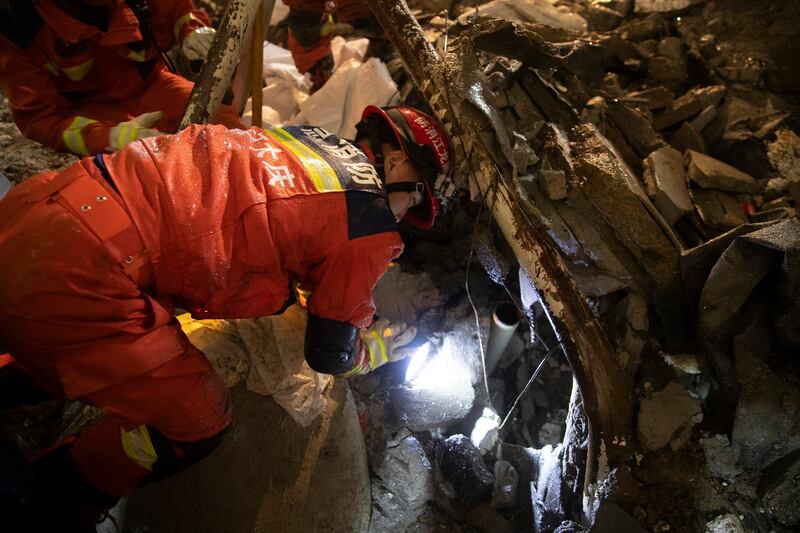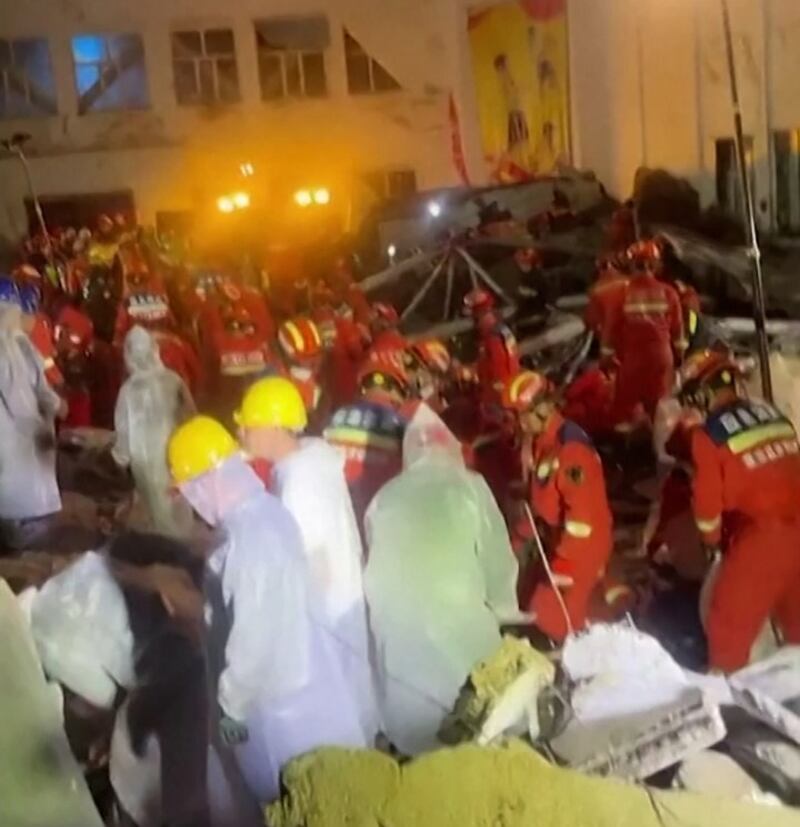A grief-stricken father who lost his daughter in Sunday's collapse of a high-school gymnasium in the northeastern Chinese city of Qiqihar has hit out at the authorities for their response to the tragedy, including arrangements for identifying students who died.
At least 11 people died when the concrete roof of the gymnasium building at the Qiqihar No. 34 Junior High School collapsed on Sunday afternoon, with many of the victims members of the girls' volleyball team. Nineteen people were in the building at the time.
"All of our kids were covered in dust and blood and dirt, and you haven't even allowed us to identify them," the father of a student at the school said in a video uploaded to Twitter by citizen journalist "Mr Li is not your teacher." "Maybe that's not even my kid."
As classmates and loved ones placed floral tributes for the victims outside the school gates, the man said the government seemed to have bereaved relatives under surveillance instead of keeping them informed and supported.
"There are so many officials from the education bureau here – when I came in a woman official followed me in, but she wasn't there to help us liaise with the doctors – she was there to watch us to see what we did and report back to her superiors," the man, who was reportedly waiting outside the morgue at a local hospital, said.
"What is the Qiqihar government doing? What is the Longsha district government doing?" he said. "All we get is the police here to keep order. The doctors won't come out [and talk to us] either."
The father's outcry came after parents whose children died due to shoddy construction in the 2008 Sichuan earthquake said they have been silenced and suppressed by local officials for years, who haven't followed up on promises to investigate the collapse of school buildings that killed more than 5,000 children.
Qiqihar officials later apologized for the disaster, which they blamed on the illegal stacking of materials on the roof, which overloaded it.
Social media comments also criticized the state media for downplaying the incident and failing to consider the needs of bereaved parents.
'Indifference and inaction'
While Qiqihar Communist Party secretary Shen Hongyu bowed in apology at a news conference on Monday, many commentators said it was too little, too late.
"The video is long, and there is only one theme – that the government sent in the police to maintain order, but never sent anyone to communicate with the parents," one blogger wrote of the official response. "The indifference and inaction of the local government is just terrible."
"Maintaining order is of course important, but it's far more important to consider the feelings of the parents," the blogger wrote.

According to state news agency Xinhua, a preliminary investigation found that construction workers illegally placed perlite, an absorbent mineral with high water content, on the roof of the gymnasium during construction of a teaching building adjacent to the gymnasium.
The perlite had soaked up water during recent rainy weather and gained weight, resulting in the roof collapse, it said.
The ruling Chinese Communist Party's Beijing News hit out at the lack of oversight of construction work by the school.
"We can only avoid repeating this mistake if we truly respect construction and safety standards, and strengthen supervision and management of construction work," the paper said.
Shen told the news conference that the Heilongjiang provincial government has launched an investigation into the disaster.
But social media posts also took issue with the government's technical explanations for the incident.
"Was the collapsed gymnasium a potential safety hazard? Did the school fulfill its duty of oversight?" one blogger wanted to know, calling for further investigation into the construction company that built the gymnasium and the bidding process.
Shoddy construction?
An official who requested anonymity told Radio Free Asia that there are concerns that the gymnasium was of shoddy construction in the first place.
"The use of subcontractors is very common in the construction industry," the official said, referring to a lack of transparency and accountability for safety standards once many other companies are involved. "Once a bidder wins a contract, they distribute the work among other engineering teams."
"The labor force is actually made up of migrant workers."
And when something does go wrong, Jiangsu-based current affairs commentator Zhang Jianping said the government rarely handles such disasters in a transparent manner, meaning that public trust in officials is at a very low ebb.
"They don't announce details of disasters and public safety incidents in China in a public and transparent manner, basically to cover up their own management failures and their own responsibility," Zhang said. "So all people can do is try to guess what happened from what they're not saying."
"For example, if they tell us that 10 people were rescued, then our hearts sink, because we know for sure that many more than that died," he said. "People have their own way of figuring out what happened, and a lot of these so-called rumors are a lot more reliable than the official version."

Repeated calls to the Qiqihar municipal education bureau, the municipal government and the emergency management bureau were blocked during office hours on Monday.
Repeated calls to the Communist Party's municipal disciplinary arm also went unconnected or rang unanswered.
Anger and resentment
Beijing-based current affairs commentator Ji Feng said stability maintenance always comes first after some kind of disaster.
"The point of the police being there is stability maintenance ... and suppressing the emotions of the victims' families," Ji said. "That guy who spoke out [in the video] hasn't said anything since, so they must have shut him up."
He said he doubted that an official apology would do much to dampen public anger.
"If they don't find out who is responsible, then public anger and resentment will rise, and eventually there will be a mass incident," he said.
People in China frequently challenge those in power, despite nationwide measures aimed at nipping popular protest in the bud, the U.S.-based think tank Freedom House reported in November 2022.
Despite pervasive surveillance, a "grid" system of law enforcement at the neighborhood level and targeted "stability maintenance" system aimed at controlling critics of the government before they take action, the group identified hundreds of incidents of public protest between June and September 2022 alone.
Translated by Luisetta Mudie .
